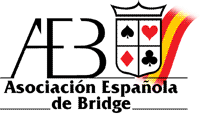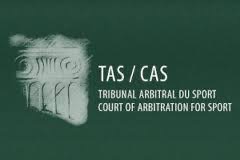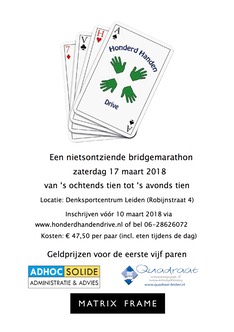Some weeks ago, the bridge world was shocked to hear that the CAS, the Court of Arbitration for Sport, overturned an earlier decision by the EBL (the European Bridge League) in the case of Fulvio Fantoni and Claudio Nunes. As you remember, Fantunes, as they are known, were accused of using the position of a card to indicate the possesion of a high honnor in the suit led. In a blog 4 weeks ago, I predicted that would not be the end of the matter.
Well, I was right. In the first weekend of February, Fulvio Fantoni participated in a tournament in Barcelona and, of course, was recognized by a lot of players. To make matters worse, the tournament was called an "International Event” organized by the ACB, the Catalonian Bridge Association, and Fantoni’s partner was the president of that organization. On Bridgewinners, the outrage immediately started. Comments can be summarized in two categories: first, despite the ruling by the CAS, Fantoni is still suspended by the FIGB thus cannot play anyway, and second: whatever the CAS says, players don’t want to see his face again at any tournament, period.
Now, one can write whatever one wants on the Internet, but we should look at the facts.
1. What is this ACB?
First, how is bridge organized in Europe? Usually players are member of a local bridge clubs or a direct member of the NCBO (National Contract Bridge Association) in their country. The clubs are a member of the NCBO as well. The NCBO’s in turn are members of the EBL, the European Bridge League. That is a nice structure. Whenever one joins a higher level, one automatically agrees to the bylaws of that higher organization.

But, any group of players can set up a bridge club and exactly nothing forces them to join the NCBO in their country. In fact, there are quite a few clubs in this area who do this intentionally: little old ladies playing a game of bridge once a week, who could not care less if there is a national federation, let alone pay for it. The same goes a level higher, if a country does not want to join the EBL, nobody can force them to do so. Of course, they lose out on the benefits but that is their choice. In Spain, the NCBO is the AEB or Asociación Española de Bridge.
Now the tournament in Barcelona was in Catalonia and organized by an organization called the ACB, which stands for Association Catalana de Bridge. This organization, and that has been recognized by the EBL (scroll down to the English text from Yves Aubry near the bottom), is not a member of the EBL, nor does it seem to be a member of the AEB.
Now, under normal circumstances, a player suspended by the FIGB, would also be suspended by the EBL, and then the AEB (and all other member states). However, if the ACB is not a member of any of these organizations, what, if any jurisdiction to they have to prevent Fantoni from participating? As far as I can see, none at all. Which simply means that Mr. Fantoni is free to enter this event and it is up to the organizers to accept his entry. Nothing the EBL can do.
Interesting aside, somebody pointed me to this page, which is an announcement for the tournament in Barcelona.It is on the EBL site, how can the EBL post a tournament announcement from an organization that they do not know?
2.Who handed out the final verdict?
A second point. In the case of Fantoni-Nunes, two different paths were followed to convict the players of cheating. First, the FIGB, the Italian Bridge Federation, investigated what happened at the 2014 European Championships where it was first discovered that they might use illegal signals. In parallel, the Disciplinary Committee of the EBL did exactly the same. Both found them guilty and then the appeals started. In Italy, all appeals were denied and they were suspended until April 2019. In Europe, the matter ended up at the CAS and overruled the decision. In other words, for the same facts, the pair is found guilty by one body, and at the same time, not guilty by another body. Which of the two takes preference? I don’t know, nor could I find it in any document. This is a rather unique event, that does not seem to have a parallel anywhere else.
In the meantime, the EBL has declared that they consider the suspencion by the FIGB still to be valid. Of course, that is very convenient for them, Fantunes are still suspended even though the EBL has been told otherwise by the CAS, but I doublt if this will hold up in any court.
3. Let’s read the CAS decision!

Next, the CAS decision itself. I finally found time to go through it in detail, it is 40-odd pages of legalise that is not easy to digest. As is usual in these documents, a lot of it is about procedures followed to ensure that FN got a fair trial. Whatever one thinks about the expertise of the CAS in bridge matters, they seem to have done a very thorough job of reviewing all this material.
At the same time, the defence for Fantunes seems to have done the same, going through all documents in details, questioning everything which potentially might be wrong and generally causing doubt about every step in the process. That is, for the defence, a valid tactic. Remember that it is the prosecution’s job to prove that FN are guilty, it is not the defender’s job to prove that they are innocent.
This cannot be said for the prosecution. Yes, there is good material from their side, including an attempt to explain the tough topic of the use of statistical evidence. But they also seem to undermine their own case. For example:
- “The appellants have failed to offer an alternative explanation for the non-random placement of the cards”. First they have offered this explanation, which was simple: we place the cards randomly on the table. Second, it is not their task to do so, otherwise it would be very easy to convict anybody of anything.
- Or “Piekarek/Smirnov have identified FN as a dirty pair”. This assumes facts that are not substantiated.
- And finally, “Mr. Drijver (expert witness), [,,,] stated that he was not an expert on the Slavinski system”. You call an expert witness who then says that he is not an expert?
When reading the document, my conclusion is that the prosecution assumed that the evidence was sufficient, the CAS would understand it and did a sloppy job in presenting the matter to non bridge players. The defence caused sufficient confusion, and the panel could not conclude that the allegations were proved to its comfortable satisfaction, the standard set by them.
4. Time to misquote it!
Finally, the CAS concludes by overturning the decision by the EBL They then add:
Such conclusion does not mean that the players are innocent [,,,], it only means that the EBL did not manage to prove to the comfortable satisfaction of the panel that the players committed an infraction”.
While this is fully correct, it seems to have created lots of confusion and misinterpretation. It is basically very simple. Two sides, the EBL and Fantunes, both argued their case and the panel had to decide. Now, in any tribunal, the assumption is “innocent until proven guilty”, putting the burden of proof on the prosecution. Guilt was not proven to the standard required by law, so the the players are to be presumed innocent.
Yet, I already saw a comment from EBL president Yves Aubry "CAS said that EBL has not proved enough with statistics they were cheating, CAS add this does not mean they are innocent of any wrongdoing." Well, sorry Yves, but you got it wrong. If the EBL failed to prove the allegations, then something else may have have happened that we do not know yet.
And it gets worse when he continues with "and if EBL has presented other evidences maybe CAS Award has been different”. That is interesting, it suggest that the EBL had more material in the case, but for some reason or another, they decided not to present it. Why, if it is incriminating material, why not include it, it only increases the probabilty that the EBL will be succesful. Basically, Aubry here says that the EBL did not do a proper job.
No doubt to be continued...

Finally, time for a commercial.
Colleague DKL Marcel from Leiden asked me to post this flyer for the marathon he is organizing on March 17: 100 hands in 12 hours, from 10am to 10pm. (And yes, that is right, 100 hands at the usual pace of 8 boards a round means that there is no lunch or dinner break, if you are hungry, eat a sandwich when you are dummy). Click on the image for the flyer or visit www.100handendrive.nl to register.
